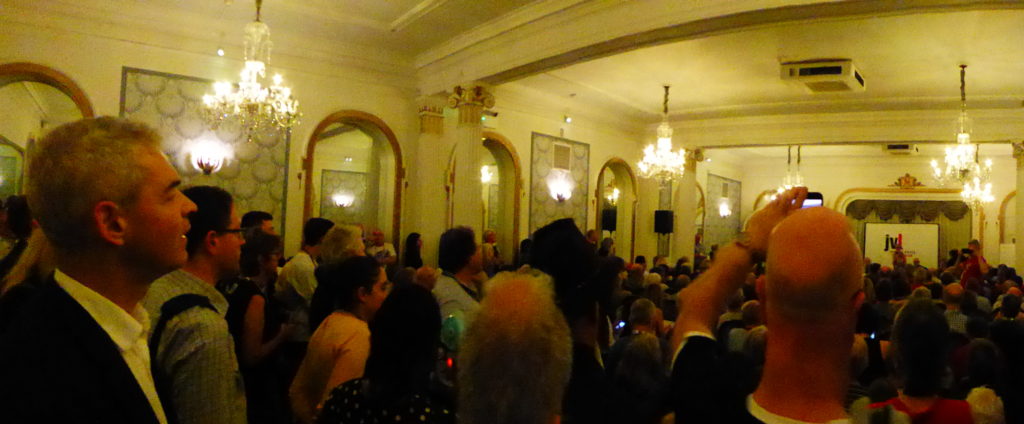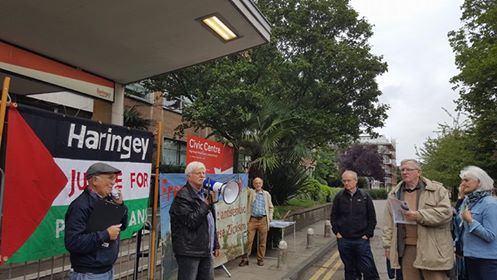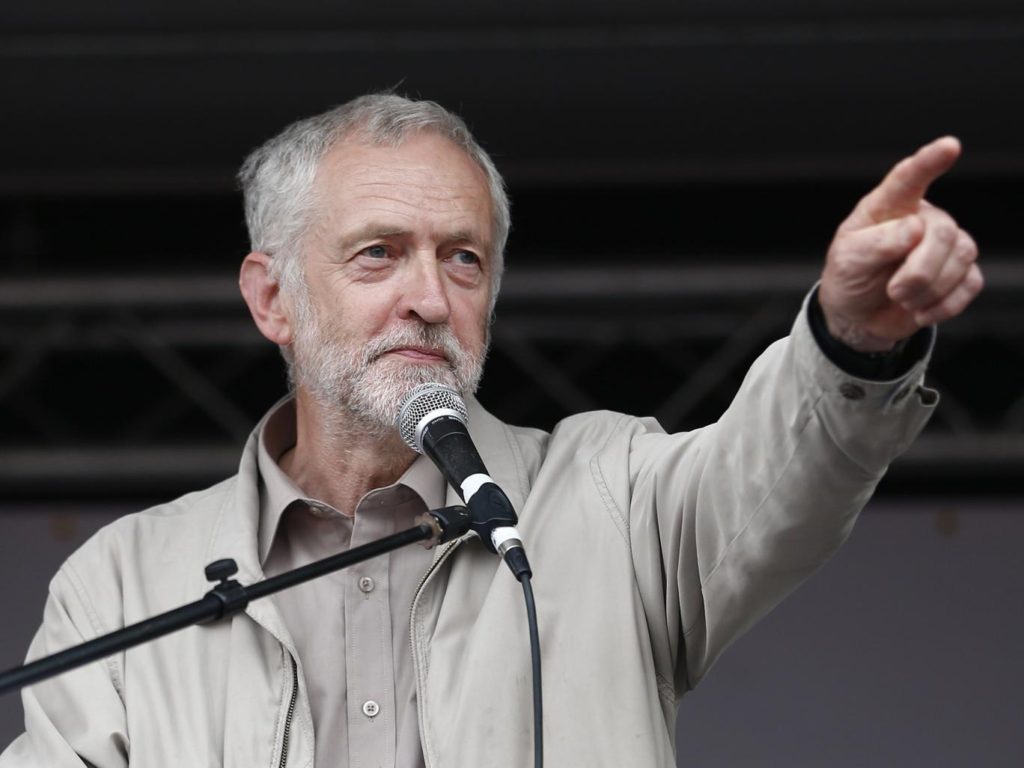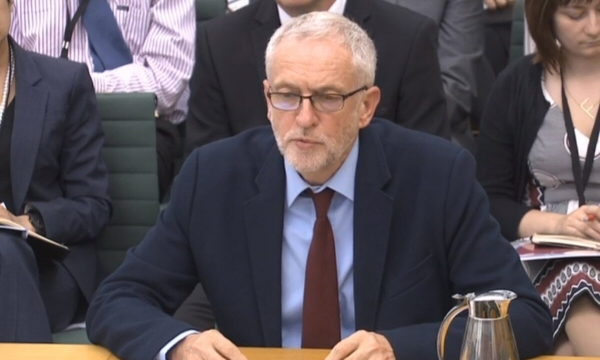From Blairite to far-right, the British political elite is relishing having discovered the ultimate weapon of mass destruction to try and block the growth of a movement of the left around Labour Party leader Jeremy Corbyn.
All it needs to do is fire off round after round of unsubstantiated assertions of antisemitism, deploying circular and often contradictory arguments.
The left, so the mantra goes, has always been riddled with antisemitism. To deny this is, by definition, antisemitic.
Corbyn is in denial, according to his critics. The ardent pro-Israel advocate Howard Jacobson has accused him of belonging to the “more un-self-questioning wing of British politics.” Those words are probably more applicable to Tony Blair, the former prime minister and Corbyn’s arch enemy.
Jacobson, a novelist and academic, graciously allows in a recent opinion piece that Israel may be subjected to “fair and honest” criticism but asserts, in the face of reams of historical evidence to the contrary, that the Zionism which created and upholds the state is a “dreamy” and idealistic national liberation movement of the Jewish people that has nothing to do with conquest or colonial expansion.
The clincher is Jacobson’s assertion – denied by a considerable body of Jewish opinion – that anti-Zionism is equivalent to repudiating Israel’s right to exist and is therefore “almost invariably” antisemitic.
Case closed. There really is nothing left to say.
“Open season on minorities”
Where does this leave the UK as a proudly democratic society that values freedom of speech? We value it so highly that just last month, the Independent Press Standards Organisation – the media regulator established by UK newspapers – ruled that Kelvin MacKenzie, a former editor of The Sun, was free to denounce Channel 4 for letting a headscarf-wearing Muslim woman, Fatima Manji, report on the Nice terror attacks.
Manji said this meant that it was now “open season on minorities and Muslims, in particular.”
It leaves us in an unpleasant place, following the vote to exit the European Union, where upsetting Muslims and other non-whites is fine. Upsetting friends of Israel is not allowed, however – especially, but not exclusively, if they are Jewish.
It’s also fine to upset Jews like me who are not Zionists. Wes Streeting, a member of parliament (not a Jew), called me a “massive racist” in a tweet about an interview I did with the radio station LBC during October.
But then I’m a pro-Palestinian activist who supports the boycott, divestment and sanctions (BDS) campaign inspired by the South African anti-apartheid movement. Streeting evidently believes I can be discounted as a self-hating Jew.
Just to be clear, I have no time for conspiracy theorists who see Israel as the root of all evil. I do not tolerate anti-Jewish racism, whether or not it is coupled with claims of supporting justice for Palestine, as it sometimes is.
Nor do my fellow campaigners in Free Speech on Israel. We demand justice and security for both Palestinians and Israelis, Arabs and Jews, and we agree with the Arab-Jewish Forum’s Tony Klug who wrote in The Jewish Chronicle earlier this year: “While antisemitism is monstrous – and, like all forms of racism, should be vigorously dealt with – false accusations of antisemitism are monstrous too.”
Disturbingly, the recent report on antisemitism in the UK from the Home Affairs Committee in the House of Commons gives a free pass to those making false accusations.
Released on 16 October, the report performs a service by highlighting the role of social media – in particular Twitter – in facilitating deplorable abuse and threats to individuals. It also makes the important point, ignored by most media, that the far right is behind 75 percent of all politically motivated antisemitic incidents.
Its main thrust, however, is that antisemitism is rampant and tolerated in the Labour Party, the National Union of Students and elsewhere on the left and that a “new definition” of antisemitism is required so that we can halt this alleged scourge. It is a gift to the pro-Israel, anti-Corbyn brigade who welcomed it ecstatically.
Moral panic
The Campaign Against Antisemitism (CAA), an intensely Zionist group, tweeted, “We could not have written this report better ourselves.”

Until the current wave of moral panic, people generally knew what bigotry was and what was specific about the anti-Jewish bigotry usually called antisemitism.
As the Free Speech On Israel website says, language or behavior is anti-Semitic if it expresses hatred of Jews, or inflicts or incites violence against them, because they are Jews; if it stereotypes Jews on the basis of alleged negative personal characteristics such as being mean, sly and avaricious; if it links Jews to conspiracy theories about world domination of media, financial or governmental institutions; if it suggests Jews were responsible for, or fabricated, the Holocaust.
Most people would also agree that it is antisemitic to implicate all Jews in the actions of the Israeli state or to accuse all Jews of embracing a single ideology – Zionism, for example.
Yet no one is more determined to suggest that all Jews owe loyalty to the State of Israel, and that Zionism is part and parcel of being Jewish, than Zionists like Jacobson and the CAA. It isn’t so long ago that Ephraim Mirvis, Britain’s chief rabbi, declared that Zionism was a “noble and integral part of Judaism.”
A long list of Jews including well-known figures such as the filmmaker Mike Leigh, actor Miriam Margolyes and writer Michael Rosen put their names to a letter repudiating the chief rabbi’s version of their identity. Gideon Falter, the CAA’s chair, dismissed them as “a fringe assortment of British Jews” who had committed an “anti-Semitic slur” against his group.
Is it any wonder that some people outraged by Israel’s treatment of the Palestinians may take the chief rabbi at his word and hold all Jews responsible for what is done in their name?
If only the report from the Home Affairs Committee had tackled this contradiction and affirmed that there are different forms of Jewish identity, different traditions to which Jews adhere, including radical traditions that have no connection with Zionism.
Instead the committee promotes a “new definition” of antisemitism that does everything Falter, Streeting and company desire. If imposed on all areas of public life, as the committee proposes, opposition to their partisan approach is at risk of being criminalized.
To start with, the committee exalts its definition of antisemitism as being “based broadly on the working definition of the European Monitoring Centre on Racism and Xenophobia (EUMC).” That falsely gives the impression that the definition favored has already been approved by the European Union.
The so-called working definition appeared on the EUMC website as a discussion document that was found wanting and dropped. It was originally drafted more than a decade ago by Zionist lobby groups, which have pushed it relentlessly since then.
The home affairs committee report lists some of the obvious characteristics of antisemitism but muddies the waters by introducing Israel into the equation.
We already have extensive evidence of how this will be used to censor debate – an academic conference canceled, a theater director pilloried, school children denied involvement in a literary festival.
It is not only Jewish Zionists who are guilty of this kind of censorship. In the three cases mentioned, non-Jewish Conservative cabinet ministers were actively involved.
The Home Affairs Committee’s “new definition” offers myriad opportunities for conflating criticism of Israel with antisemitism. As I write, Israel’s CAA friends are filing a complaint against the School of Oriental and African Studies in London for allowing writer Tom Suarez to lecture about the violent origins of the Israeli state.
These are some of the more problematic examples given in the “new definition”:
Accusing Jewish citizens of being more loyal to Israel, or to the alleged priorities of Jews worldwide, than to the interests of their own nations.
If this is antisemitic, then Jewish organizations that uphold loyalty to Israel – as most do – will be immune from criticism for doing so. Dissenting Jews, or anyone else who wonders aloud why the Board of Deputies of British Jews, which claims to represent all Jews in the country, persists in supporting Israel right or wrong, will be silenced.
Denying the Jewish people their right to self-determination, e.g. by claiming that the existence of a State of Israel is a racist endeavor.
This clause is particularly pernicious. Rights attach to human beings, not states. Asserting the right to self-determination does not give any group a right to suppress others in its name. Palestinians also have rights, including the right to protest at the injustices inflicted upon them in the name of Jewish self-determination. It is not antisemitic for them to do so, nor for anyone else to support them.
Nor is it antisemitic to identify the racism present in the origins of the Israeli state. Jacobson may call its creation an act of “dreamy” idealism – but it was almost by definition a racist endeavor since the intention was to conquer and occupy the maximum amount of land while ensuring that the fewest possible non-Jewish inhabitants remained on it.
Modern Israel offers multiple examples of racism, some of it extreme.
Applying double standards by requiring of it [Israel] a behavior not expected or demanded of any other democratic nation.
In practice, what Israel’s defenders complain of is Israel being expected to abide by internationally accepted norms while other states behave as badly or worse. Israel’s critics point out that Israel is exceptionally favored on the international scene by being allowed to get away with breaches of international law and human rights conventions without facing any sanction. It is not antisemitic to call Israel to account for those breaches.
Using the symbols and images associated with classic anti-Semitism (e.g. claims of Jews killing Jesus or blood libel) to characterize Israel or Israelis.
The blood libel is a horrifying medieval superstition that led to the slaughter of innocent Jews accused of using the blood of Christian children in religious rites. Today’s pro-Israel censors frequently allege “blood libel” when anyone comments on the shedding of Palestinian blood.
Veteran cartoonist Gerald Scarfe found himself in the center of a diplomatic storm when he dared to portray Benjamin Netanyahu, Israel’s prime minister, cementing bleeding bodies between the slabs of a wall. To call this a blood libel distorts Jewish history and, as one Israeli commentator argued at the time, is “not antisemitic by any standard.”
It is certainly antisemitic to allege, as used to happen to my mother when she was a young girl, that Jews bear the guilt of Christ’s death, or to suggest that Jews have a propensity to slaughter children. But it is not antisemitic to hold the State of Israel or its leaders responsible for the real deaths of real children caused by their forces.
Drawing comparisons of contemporary Israeli policy to that of the Nazis.
The study of history and politics requires us to make comparisons between different societies in different times. Nazi Germany has become the benchmark for a particularly horrifying form of racist totalitarianism. Sometimes people appalled at Israel’s behavior towards Palestinians, including Jewish Israelis, reach for the worst comparison they can muster and draw Nazi parallels.
It can be hurtful and may make productive debate difficult. But it is not antisemitic.
Holding Jews collectively responsible for actions of the State of Israel.
It is indeed bigoted to hold Jews – or any ethnic or religious group – collectively responsible for anything. But people can hardly be blamed for believing that Jews and Israel are indivisible when most mainstream Jewish organizations are solidly aligned with Israel and Zionism.
It would be far more beneficial for people who are confused about this to learn about non-Zionist Jewish traditions than to drum them out of the Labour Party for crossing a line laid down by pro-Israel partisans.
The Home Affairs Committee report calls for its seriously flawed pseudo-definition to be “formally adopted by the UK government, law enforcement agencies and all political parties, to assist them in determining whether or not an incident or discourse can be regarded as antisemitic.”
There is considerable danger in this.
Not only is the committee’s definition a threat to the possibility of holding intelligent, informed discussion about one of the great moral and political issues of our time, it is also a potential spur to anti-Jewish sentiment because it gives the impression that debate is to be censored at the behest of a Jewish collective acting on behalf of the State of Israel.
Unquestioning media bear much of the blame for obscuring the fact that many Jews are not Zionists and a great many Zionists are not Jews.
While many of us Jewish dissenters have been at the forefront of defending Jeremy Corbyn in his attempts to build a grassroots socialist movement, his enemies have united to undermine him, regardless of their faith backgrounds.
It is not too late to avert the threat to freedom of speech posed by the cynical political games afoot. We should start by rejecting the Home Affairs Committee’s phony definition of antisemitism.













